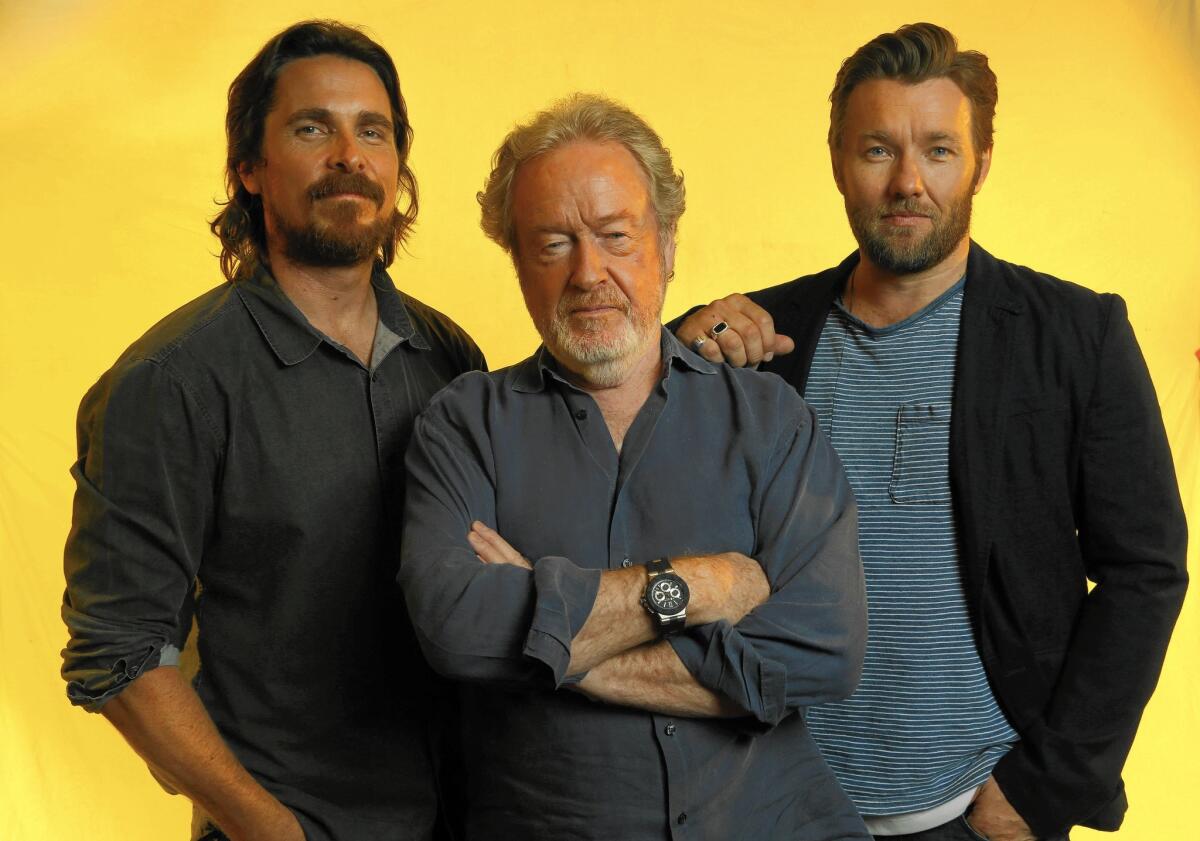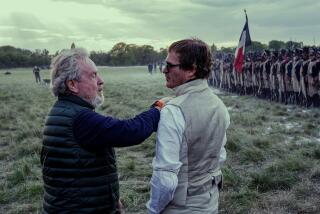Ridley Scott’s ‘Exodus’ casts a wide net of spectacle and family

In Ridley Scott’s lavish new 3-D epic, “Exodus: Gods and Kings,” rivers run with blood, ancient seas part with tsunami force, and Christian Bale delivers a portrait of Moses as a passionate, hot-tempered holy man who struggles with his relationship to God, depicted as an androgynous, strong-willed child.
It’s a radical departure from Cecil B. DeMille’s Hollywood standard-bearer “The Ten Commandments,” and even months before the release of their costly new popcorn retelling of the Old Testament story, Scott, Bale and Australian actor Joel Edgerton, who stars as the Egyptian Pharaoh Ramses, were bracing themselves for a wallop of a reaction.
“The reception, I think, that you’re going to get to this is extremes,” Bale said. “The film is one of extremes.”
Maybe it was his time playing one of civilization’s most famous prophets, but Bale’s prediction has proved spot-on. From the outset, “Exodus: Gods and Kings” generated controversy over its choice of two Caucasian actors to play the leads. That particular point of contention flared up again just days before the movie’s Dec. 12 opening after Fox’s Chief Executive Rupert Murdoch tried to defend the movie on Twitter by asking “Since when are Egyptians not white?”
It remains to be seen how audiences might react to 11-year-old Isaac Andrews as the God who instructs Moses to leave his family and save the Hebrews from enslavement.
But seated in a suite at a Beverly Hills hotel with his leading men on a late September morning, Scott seemed relaxed and in high spirits, satisfied with the creative decisions that conjured his “Exodus.” He set out to chronicle Moses’ journey from privileged son of Egypt to embattled leader of the Israelites with enough blockbuster bombast to impress the Almighty himself.
Scott wasn’t interested in merely repeating the cinematic triumphs of the past or offering moviegoers a sermon.
“I didn’t want audiences to feel they were going to go and see a Bible movie,” said Scott, 77. “I wanted audiences to feel they were going to see a film about two men who wouldn’t normally be brothers who are in competition with each other. One happens to be the pharaoh that will be, the other one is his friend and closest ally, and they come apart at the seams over the question of the nature of his nationality.”
If his approach works, “Exodus” could qualify as one of Scott’s biggest miracles, an end-of-the-year counterpoint to Darren Aronofsky’s sci-fi inflected “Noah,” which played to a somewhat mixed reaction in the spring. Scott’s specialty is spectacle; he dreams in wide screen, and it wasn’t so long ago he resurrected the sword and sandals genre to best picture acclaim with 2000’s “Gladiator.”
“What I do for a living, I secretly enjoy most doing things where part of the task is to create universes,” Scott said. “It’s hard. I always think the universe that the actors work in is more than the proscenium, it’s one of the most important characters.”
A human Moses
Producer Peter Chernin, who oversaw the movie business at Fox for years before launching his own venture, initially reached out to Scott to gauge his interest in directing the film. Scott’s relationship with the studio dates to his 1979 breakthrough, “Alien,” and he’s made numerous other movies with the studio, including his most recent, last year’s star-studded drama, “The Counselor,” which fizzled at the box office.
Reading the “Exodus: Gods and Kings” script, credited to Adam Cooper, Bill Collage, Jeffrey Caine and Steven Zaillian, the director said he was intrigued by the scope and scale of the production but also “gobsmacked” by what he didn’t know about Moses.
Bale too said he was surprised by what he turned up in his extensive readings to prepare for the role, which included studying the Old Testament, the Torah, parts of the Koran and Jonathan Kirsch’s book “Moses: A Life.”
“This guy had a really tumultuous life,” said the Oscar-winning actor, who came to the set of “Exodus” fresh off playing a slovenly con man in David O’Russell’s “American Hustle.” “In his early years, he was absolutely prone to all the temptations and passions of all of us in everyday life. Even in his relationship with God, he wrestles, he fights, he tries to ignore him… You don’t see that relationship very often. As you learn in the film, that’s the meaning of Israelite, somebody who wrestles with God.”
At the outset of the film, Moses hasn’t yet learned the truth about his Hebrew identity and instead he’s a warrior prince concerned with more earthly travails, including a pending siege of 15,000 soldiers against a Hittite army at the Battle of Kadesh. It’s only after they claim victory that Moses, on a visit to the slave quarters near the marble quarry, encounters the scholar Nun (Ben Kingsley), who explains to him the real circumstances of his birth.
Rumors spread throughout the kingdom that the favored son of the Pharaoh Seti (John Turturro) is, in fact, the descendant of slaves. Ramses banishes Moses from the kingdom, and he eventually finds shelter and a bride in the village of Midian. After seven years he’s also confronted by a demanding God, who insists that Moses return to Egypt and secure the freedom of the Hebrews.
Edgerton, known for a turn in the Aussie indie “Animal Kingdom” and for such films as “Warrior” and “The Great Gatsby,” said he wanted Ramses to come across as a sympathetic figure, despite his willingness to perpetuate the injustices against the Hebrews.
“I’m a real sucker, and I think audiences are too, for family relationships, particularly when you reduce that to relationships between brothers,” Edgerton said. “I have a very strong relationship with my brother and of the pride involved for Ramses of having a father who quite openly favors someone else, listens to someone else, holds more weight in another person’s opinion…”
“It’s interesting, isn’t it?” Bale interjects with a wink and a deadpan nod, “because your dad, your real dad, kind of prefers me to you. So we could draw on our own lives.”
Dramatic effects
Although Scott had previously mounted a religious epic of a different sort with his Crusades costume drama “Kingdom of Heaven,” “Exodus” was by far a more difficult film to make. (Asked about concern over the film’s casting, Scott said, “I like to cast people that form into a team. We’re totally multinational.”)
Shot in just 74 days, the $140-million production — which reportedly cost $200 million before tax incentives and rebates — visited England’s Pinewood Studios, in addition to Almeria in southern Spain and Fuerteventura, one of the Canary Islands off the coast of Africa.
It took more than 1,500 visual effects shots to digitally bolster the ranks of the Hebrews and to help authentically render plagues of hail, locusts and frogs, although some 400 actual amphibians were brought to set at one point. And then there was the matter of the movie’s most visually dramatic set piece, the parting of the Red Sea, which Scott said was inspired by a tsunami believed to have been triggered by an underwater earthquake off the Italian coast circa 3000 BC.
“I mostly don’t lose sleep when I’m making a film,” said Scott, who already has moved on to his next project, the Matt Damon-starrer “The Martian,” for Fox. “This one, I lost a little bit of sleep.”
More to Read
Only good movies
Get the Indie Focus newsletter, Mark Olsen's weekly guide to the world of cinema.
You may occasionally receive promotional content from the Los Angeles Times.











